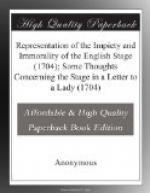I know, Madam, this is strange Doctrine to some People. If a Man talks to them of leaving the Plays, they wonder what he means, and are ready to take him for a Madman. They have so long habituated themselves to the Play-Houses, that they begin to think a Place there, to be part of their Birth-Right: But I desire such would be perswaded to hear what the late A. B. Tillotson thought of these matters, (and I hope some Deference is due to his Judgment). If they look into the 11th Volume of his ‘Sermons’, they will find that in his Discourse against the Evil of Corrupt Communication, he tells them, That Plays, as the Stage now is, are intolerable, and not fit to be permitted in a Civiliz’d, much less in a Christian Nation, They do most notoriously minister, says he, both to Infidelity and Vice. By the Prophaneness of them they are apt to instil bad Principles into the Minds of Men, and to lessen that Awe, and Reverence which all Men ought to have for God and Religion: and by their Lewdness they teach Vice, and art apt to infect the Minds of Men, and dispose them to Lewd and Dissolute Practices. And therefore, says he, I do not see how any Person pretending to Sobriety and Virtue, and especially to the pure and holy Religion of our Blessed Saviour; can, without great Guilt and open Contradiction to his Holy Profession, be present at such Lewd and Immodest Plays, much less frequent them, as too many do, who would yet take it very ill to be shut out of the Communion of Christians, as they would most certainly have been in the first and purest Ages of Christianity.
This is the Opinion, Madam, of that Excellent Man: and, one would think, it should put those Persons who are the Encouragers of Plays, and the Frequenters of them, when they read it, upon an Enquiry, What it is they are doing? Whether they are not carrying on the Designs of the great Enemy of Mankind? But if that will not prevail upon them, let ’em reflect upon the late Instance of God’s severe Displeasure against us, and tell me then, whether they think it consistent with that Humiliation and Repentance which this great Judgment ought to awaken in us, and which Her Majesty, by Her late Gracious Proclamation, calls upon us to Exercise, to be ever again present at a Place, where they must often hear the Name of God Prophaned, and every thing that is Serious made a Jest of? A Place which they cannot but know, and must own, (if put to the Question) has contributed so much to the Corrupting the present Age; and which, ’tis to be fear’d, is one of those accursed things, that has provok’d the Almighty to be so angry with us.




